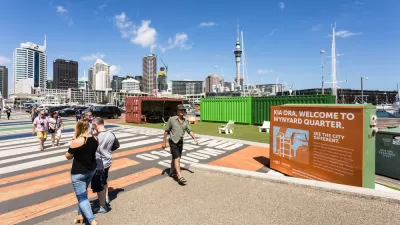What's your elevator pitch on why placemaking matters? Here's a couple rounded up by Hazel Borys, and some numbers that help refine their message.
"When a mayoral candidate from my city wrote me to ask me to repeat in writing what I’d said the night before, I realize I need to de-wonk and make my elevator speech more memorable. Why does city planning matter to people who aren’t urban designer types? If I could take an extra five minutes of your time, I’m interested in hearing each of your pitches, in the comments below. Here’s mine, thanks in part to countless conversations with many of you:
"For the last 75 years, we’ve been engaged in a Ponzi scheme of paying for the far-flung suburbs with money generated downtown, in compact neighborhoods, and from other levels of government. These sprawling bedroom communities, strip malls, and big boxes arranged in patterns where everyone needs a car are providing a negative return on investment. The roads, water, and sewer cost almost double for these dispersed places, while the return to city and private coffers pale in comparison. Compact neighborhoods return at least 10x more revenue per acre to the City, and often 1,000x more income per acre. At a time when less than half of our population doesn’t drive – because they’re too young, too old, too poor, or just choose not to – isn’t it about time that we change our zoning laws to make the sorts of places that will stop bankrupting our cities?"
Borys goes on to round up studies and numbers that make the case for walkable places.
FULL STORY: Why Placemaking Matters: What’s in it for me?

Planetizen Federal Action Tracker
A weekly monitor of how Trump’s orders and actions are impacting planners and planning in America.

Chicago’s Ghost Rails
Just beneath the surface of the modern city lie the remnants of its expansive early 20th-century streetcar system.

San Antonio and Austin are Fusing Into one Massive Megaregion
The region spanning the two central Texas cities is growing fast, posing challenges for local infrastructure and water supplies.

Since Zion's Shuttles Went Electric “The Smog is Gone”
Visitors to Zion National Park can enjoy the canyon via the nation’s first fully electric park shuttle system.

Trump Distributing DOT Safety Funds at 1/10 Rate of Biden
Funds for Safe Streets and other transportation safety and equity programs are being held up by administrative reviews and conflicts with the Trump administration’s priorities.

German Cities Subsidize Taxis for Women Amid Wave of Violence
Free or low-cost taxi rides can help women navigate cities more safely, but critics say the programs don't address the root causes of violence against women.
Urban Design for Planners 1: Software Tools
This six-course series explores essential urban design concepts using open source software and equips planners with the tools they need to participate fully in the urban design process.
Planning for Universal Design
Learn the tools for implementing Universal Design in planning regulations.
planning NEXT
Appalachian Highlands Housing Partners
Mpact (founded as Rail~Volution)
City of Camden Redevelopment Agency
City of Astoria
City of Portland
City of Laramie



























